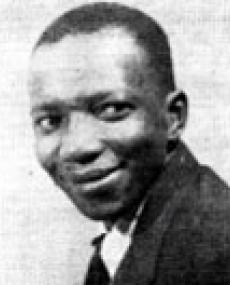
William 'Bloke' Modisane was born on 28 August 1923. He grew up in Sophiatown, a multiracial suburb in Johannesburg. His father was murdered and sister died from malnutrition at a very young age. His mother resorted to running a shebeen in order to provide the family with livelihood means. Modisane wrote that:
My mother accepted her life, and I suppose, so did the other shebeen queens; they chose this life and accommodated the hazards. My mother wanted a better life for her children, a kind of insurance against poverty by trying to give me a prestige profession, and if necessary would go to jail whilst doing it. "(Modisane, Blame Me on History )
Modisane started working at Vanguard bookshop, which was owned by a former trade unionist. He later joined the Drum magazine at the time when the magazine was known for its investigative journalism that exposed the prison and farm conditions in the 1950s. He was part of a team of writers that included Henry Nxumalo, Can Themba, Es'kia Mphahlele, and Lewis Nkosi all with high literary writing skills. He also worked as a jazz critic for the Golden City Post, the Johannesburg weekly tabloid and Drum's sister publication. It was from the Leslie Charteris thriller novels featuring the Saint that he got his nickname “Bloke”. While working for Drum he used his position to advance the objectives of the non-racial Union of South Africa Artists and the Arts Federation.
His short stories, 'The Dignity of Begging' and 'The Respectable Pickpocket' (1954), were published by Drum in 1951. 'The Situation', which was published by Black Orpheus, was about an educated African, who is 'situated' above his people and finds he does not fit in neatly anywhere. Modisane was part of the African Theatre Workshop and played Shark in the first production of Athol Fugard's play No-Good Friday.
In 1959, Modisane left South Africa for England. There in 1963 he published Blame Me on History. The book is similar to Can Themba's short story Requiem for Sophiatown, which was destroyed in the late 1950s, and an examination of what apartheid does to the character and self-esteem of the educated black man. The book was banned in South Africa in 1966. In exile, he worked as a writer, actor, and broadcaster and starred in The Blacks at the Royal Court Theatre drama.
He died in Dortmund, West Germany in 1986 at the age of 63. He was one of South Africa finest writer and intellectuals.